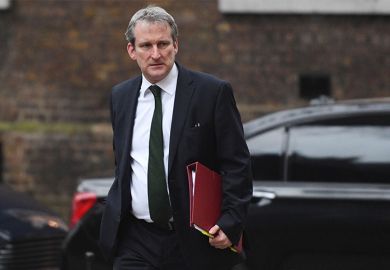The UK government has called on PayPal to stopped processing payments for essay mills after Google and YouTube took down hundreds of contract cheating advertisements.
In the first of what the government has described as “interventions” on higher education issues, the education secretary, Damian Hinds, praised Google and YouTube for removing promotions for essay writing services but stressed that it was “vital that we all unite to clamp down on this practice and the companies that are feeding on it”.
In November, the Quality Assurance Agency wrote to Google urging the company to take down hundreds of adverts for essay writing services, which it has since done. YouTube has taken similar action, after the BBC revealed that hundreds of YouTube stars were being paid to advertise EduBirdie, a Ukrainian essay mill, in 2018.
“Other platforms that have not acknowledged this issue are being told to follow suit,” the Department for Education said.
Mr Hinds said it was “simply unethical for these companies to profit from this dishonest business which is exploiting young people, and it is time to stamp them out of our world-class higher education sector”.
“I am determined to beat the cheats who threaten the integrity of our system and am calling on online giants, such as PayPal, to block payments or end the advertisement of these services – it is their moral duty to do so,” he said.
Mr Hinds said that the government also wanted universities to “crack down” on those found to use contract cheating. “Students should know that they face being thrown off their course if they are found to be cheating,” he said.
A 2018 paper by the University of Swansea’s Phil Newton found that it was likely that as many as one in seven recent graduates had recruited someone else to undertake an assignment for them.
In September 2018, 46 vice-chancellors and heads of higher education institutions signed a letter calling on Mr Hinds to introduce legislation to ban the provision and advertising of essay mills, following the lead of the Republic of Ireland and New Zealand. A recent poll by Times Higher Education found that a number of academics were in favour of prosecuting students who use essay mills.
The government also suggested that UK institutions should ask students to sign a US-style “honour code” when they arrive at university, pledging not to use essay writing services. Mr Hinds said that university inductions must make it clear to students “from day one” that using essay writing services is unacceptable. He added that universities should not simply rely on essays for assessment.
Further announcements from Mr Hinds on grade inflation and unconditional offers are expected. The interventions have been seen as an attempt to take control of the Department for Education’s stance on higher education ahead of attempts to implement the recommendations of the forthcoming review of post-18 education in England.
Douglas Blackstock, chief executive of the QAA, said that he applauded the government for putting pressure on “powerful platforms” to “stop doing business with essay cheat companies, making it increasingly difficult for them to find an audience for the unscrupulous services that damage reputations and lives”.
Register to continue
Why register?
- Registration is free and only takes a moment
- Once registered, you can read 3 articles a month
- Sign up for our newsletter
Subscribe
Or subscribe for unlimited access to:
- Unlimited access to news, views, insights & reviews
- Digital editions
- Digital access to THE’s university and college rankings analysis
Already registered or a current subscriber?








